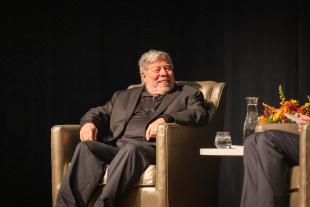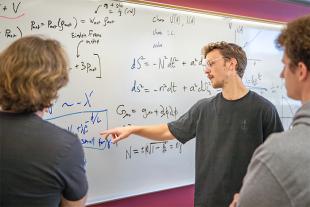Cal Poly Computing Power for Student Learning Gets a High-Performance Boost
Seven Cal Poly engineering professors received Silicon Mechanics’ sixth annual equipment grant that brings the latest in high-performance, supercomputing technologies to campus to assist in students’ education and university research.
The high performance computing (HPC) “cluster” aggregates computing power in order to solve large engineering problems. Cal Poly’s award includes high-performance processing, networking, storage and graphics processing unit technologies, valued at more than $130,000.
The HPC cluster will provide tools for sophisticated real world applications at Cal Poly that will ultimately help students integrate into the workforce upon graduation and allow graduate students to conduct research previously not possible. The areas of research the cluster will enhance or enable at Cal Poly span from computational fluid dynamics to fire dynamics to deep visual learning and cyber security. It will also allow Cal Poly to collaborate with others in the California State University system on research projects.
The successful proposal team included aerospace engineering professors Graham Doig, Amelia Grieg and David D. Marshall; computer science and software engineering professors Chris Lupo and Maria Pantoja; electrical engineering Professor Andrew Danowitz; and mechanical engineering professor Christopher Pascual. This is the first time Cal Poly has received the grant.
“This grant represents a solution we can implement immediately,” said Doig, lead investigator on the grant proposal. “The cluster will do so much for our students from a research perspective and for all our engineering project teams that employ simulation. Ultimately, it brings our departments together by breaking down some of our computing silos.”
With its manufacturing partners, Silicon Mechanics has provided more than $700,000 worth of needed technology advancements to universities and institutions since 2012. Silicon Mechanics' partners that donated product to this year's grant include Intel, Nvidia Corp., Mellanox Technologies, Supermicro, Micron Technology, Broadcom Limited, Seagate Technology, SanDisk, HGST and Bright Computing.
Silicon Mechanics announced the recipient of its annual Research Cluster Grant on April 4. The firm, based in Bothell, Wash., is a system integrator and custom design manufacturer that provides the expertise necessary to scale open technology throughout an organization.
“Silicon Mechanics and our technology partners take great pride in supporting the research cluster grant program to drastically alter the path for higher education research and curriculum advancements,” said Sue Lewis, Silicon Mechanics' chief marketing officer. “In the case of Cal Poly, this award will bring forth the first dedicated cluster on campus. We are excited to see the positive impacts for Cal Poly student-involved research, hands-on coursework and project-based co-curricular experiences in applied engineering.”




